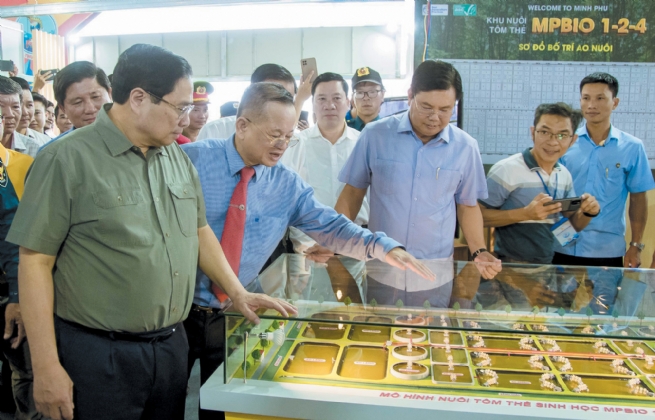Recently, Ca Mau's agricultural sector has made significant strides, consistently supporting farmers and businesses for sustainable growth. As it adapts to climate change by 2030, the province acknowledges ongoing challenges and is committed to overcoming them, aiming to advance toward modern, sustainable agriculture in harmony with nature.

Prime Minister Pham Minh Chinh visits the MPBIO 1-2-4 biological shrimp farming model exhibition booth at Minh Phu Seafood Company
Many effective models
In the 2021-2023 period, despite facing numerous challenges, Ca Mau province achieved remarkable success in its agricultural targets, particularly in restructuring the sector and developing new rural areas. According to Mr. Phan Hoang Vu, Director of the Department of Agriculture and Rural Development, the One Commune One Product (OCOP) Program has been effectively integrated with rural development efforts. Successful models have been replicated, and local specialties have established strong product brands, enhancing their value.
The marine economy in Ca Mau has grown rapidly, significantly contributing to the province's overall economic development. Investment and support programs for this sector have been effectively implemented. The province pioneered the research, manufacturing, and installation of fishing vessel monitoring equipment (VMS), achieving a 100% installation rate with 1,580 vessels equipped. The department is also focused on enhancing infrastructure and logistics for fisheries, including the development of storm shelters and fishing ports at key estuaries such as Song Doc, Rach Goc, Cai Doi Vam, Ho Gui, and Khanh Hoi.
Mr. Phan Hoang Vu said that leveraging its potential and strengths, local farmers have advanced aquaculture by adopting high-tech methods. These include white-leg shrimp farming using the Biofloc process, Semi-Biofloc for tarpaulin-covered ponds, and 2-phase and 3-phase shrimp farming technologies. Additionally, shrimp farming in the province adheres to international standards and has earned certifications such as GlobalGAP, Naturland, BAP, EU, ASC, Selva Shrimp, and VietGAP.
In recent years, large enterprises investing in agriculture have achieved positive results, meeting domestic demand and expanding into international markets. These investments have linked production, processing, and consumption, enhancing productivity, quality, and value of agricultural products. They have also created jobs, increased incomes, and driven regional agricultural development. This clearly highlights the critical role of enterprises in leveraging local agricultural strengths and supporting the province's socio-economic growth.
Promoting high-tech agriculture
In addition to leveraging existing potentials, the industry is focusing on advancing agricultural processing through high-tech applications. Mr. Phan Hoang Vu said this trend was essential for growth. The province is establishing two high-tech agricultural zones: one for aquaculture in Hang Vinh commune, Nam Can district, covering 4,320 hectares, and the high-tech shrimp farming transfer zone of Viet-Uc Corp in Tam Giang Tay commune, Ngoc Hien district, spanning 171.778 hectares. Additionally, two more areas are planned: a high-tech agricultural area for aquaculture in Tan Duyet, Tan Thuan, and Tan Dan communes, with a target of 1,000 hectares, and another high-tech area in Khanh Lam commune, U Minh district, with an expected scale of 139.98 hectares. They aim to drive breakthroughs in high-tech agriculture, introduce innovative products, and foster green agriculture with competitive advantages for Ca Mau province.
The department is dedicated to advancing science and technology in agriculture to boost productivity, quality, and sustainable development, aligning with global trends. Despite the progress, the results still fall short of the local potential in high-tech agriculture. However, foundational work has been established, paving the way for future advancements. In the coming time, the department will focus on accelerating investment in high-tech agricultural zones and concentrated production areas, aiming to attract more resources from organizations and individuals to the province.
Mr. Phan Hoang Vu emphasized, “Digital transformation across all stages namely production, processing, preservation, and consumption will revolutionize management and operational efficiency while enhancing adaptation to climate change. The department will also advise the Provincial People's Committee on implementing incentive policies and land incentives to attract investment in high-tech agriculture. Additionally, we will focus on training high-tech talent, recruiting experts, and preparing resources to attract investment. Our commitment is to develop specific agricultural plans that align with all stages and objectives.”
By Tri Nguyen, Vietnam Business Forum